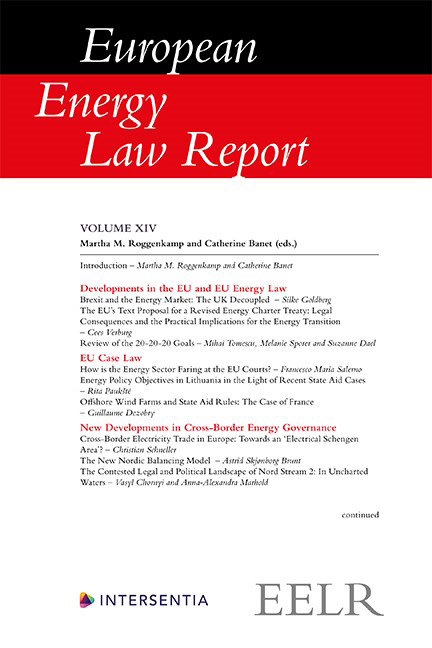Chapter V - Energy Policy Objectives in Lithuania in the Light of Recent State Aid Cases
Published online by Cambridge University Press: 26 May 2022
Summary
INTRODUCTION
The EU energy policy comprises ambitious market and non-market objectives, and Member States have been put under political, environmental and economic pressure to reach them. As part of the compliance toolbox, governments rely extensively on State support measures to pursue their national energy and climate plans. This chapter illustrates this situation by taking the example of Lithuania and examining recent State aid decisions notified by the government and approved by the European Commission in the field of energy.
Security of energy supply is the main priority of Lithuanian national energy policy. The country’s geographical location, geopolitical situation and market structure conditions this priority. In 2015, Lithuania was completely dependent on the import of Russian natural gas and had no integrated electricity grids with the European Union (EU). To ensure security of energy supply, a diversification of the energy mix and an increase in electricity production from local resources was necessary. Therefore, security of supply became a focus of the National Energy and Climate Plan (NECP) (see section 2).
These energy policy objectives are also central motivations for the adoption of national support schemes in favour of the development of a liquefied natural gas terminal and the promotion of renewable energy sources (RES) in Lithuania. However, those schemes were challenged before both the national and EU courts. The State aid decision approved by the European Commission as well as the legal disputes relevant to the schemes show that most of the schemes are breaching the requirement of prior notification and also that the Commission takes into consideration that the scheme contributes to the EU (and national) energy policy objectives when deciding on the compatibility of the aid with the internal market. Furthermore, legal disputes deriving from the aid for commissioning and operations of the Klaip ė da liquefied natural gas (LNG) terminal provides a number of lessons for market participants and their potential success challenging the aid (see section 3).
- Type
- Chapter
- Information
- European Energy Law Report , pp. 97 - 114Publisher: IntersentiaPrint publication year: 2021



